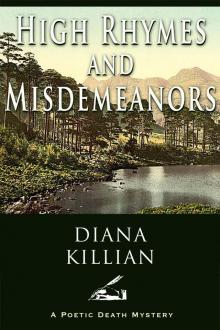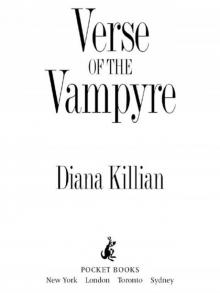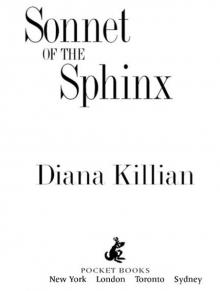- Home
- Diana Killian
Sonnet of the Sphinx Page 8
Sonnet of the Sphinx Read online
Page 8
“His dearest girl.”
“There are other dearest girls in this fair land. You, for example, might be my dearest girl.”
“I might,” she returned lightly. “But there’ve been so many, you might have me confused with another girl.”
He laughed, but there was something in his voice as he retorted, “You underestimate yourself, Esmerelda. And possibly me.”
Maybe he was right. She had to stop making those smart-alecky comments every time he tried to pay her a compliment.
She said, groping for the first safe topic she could find, “Until Sam Jeffries, no one but Mallows had lived at Mallow Farm. All this stuff came from Mallow, ergo the John who wrote the Shiloh letter must be John Mallow. The letter is dated 1943, only two years before the end of the war, which makes it circa John Mallow.”
“Except that the letter was apparently still in John Mallow’s possession when he disappeared.”
“But there are possible explanations for that.”
“Such as?”
“Perhaps it was a rough draft.”
“Of a letter?”
“Letter writing used to be an art.”
“Shaky.”
“Maybe the letter was returned. Maybe he decided not to mail it.”
“Maybe.”
“It seems more reasonable than that there should be another John with knowledge of the Shelley.”
“Take nothing in this life for granted.” Peter spoke as one who knew.
9
“POLICESEEKMYSTERYWEAPON,” blazonedThe Clarion ’s headlines the next morning. Grace realized that the police had ruled out any possibility of accidental death. Cinnamon toast seemed to lodge in her throat as she read that the murder weapon, as yet unidentified, was being searched for in Cherry Lane Park. She swallowed hard. She reminded herself that this was not news, and that the paper was merely reporting what she had already deduced.
In a reflective mood, Grace bathed and dressed in a summery pale green Ralph Lauren dress that she had bought on clearance in a Lakeland boutique. She had been illogically pleased to discover the dress, as though it were a familiar face in a crowd of too-short, too-bright, too-trendy aliens.
The truth was, she had found many lovely things in English shops (most out of her limited budget’s range) but her loyalty to American fashion was strong—although much of what she loved about “American” fashion was based on British traditions: jodhpurs, lace blouses, tweed jackets, and vintage accessories. In any case, no matter what Grace wore, she still felt that she looked unmistakably American.
She was considering this indefinable American-ness as she twisted her hair into a neat coil and studied the result. Reaching for a couple of hairpins, she started thinking once more about that mystery weapon. Surely that ruled out lead pipe, rope, wrench, revolver, dagger, and the ever-popular candlestick.
What mystery weapon would, for instance, Peter have access to on a picnic? A wine corkscrew? No, Grace had tossed that into the basket herself when she was gathering up the remains of their picnic.
There were any number of possibilities in Rogue’s Gallery: wicked daggers, lethal-looking hair ornaments and hatpins—even antique chopsticks. The Grace in the mirror looked wide-eyed at this, and the Grace on the other side of the looking glass shook her head scornfully.
She felt sure that if Peter were to commit murder—which was unlikely (because she could not imagine Peter that panicked or desperate)—he would arrange for something quick and uncomplicated. Something that could be mistaken for an accident.
Macabre thoughts for such a beautiful day! She switched off the bathroom light.
Grace generally had weekends off, although she frequently spent them with Peter. That Saturday she had received an invitation to lunch with Mr. Matsukado. She had toyed with the idea of accepting, but in the end decided to pursue another avenue.
Resisting temptation, she had returned the Shiloh letter to its hiding place in the sheet music. It seemed the fair thing. But more than this she could not bring herself to do. She didn’t dislike Mr. Matsukado, but she didn’t trust him, either. Grace had experience with fanatic collectors. Better the devil she knew than the devil she didn’t know, and she resolved to, in the words of Shelley himself, “dare the unpastured dragon in his den.”
Except this dragon was a lady dragon, and her den turned out to be the pasture-sized garden behind Brougham Manor.
As Grace was escorted across the expanse of velvet lawn she spied Lady Venetia Brougham, her niece, Allegra Clairmont-Brougham, Scott Sartyn, and a young woman she did not know engaged in what appeared to be a croquet death match.
The butler ducked as the young woman sent a croquet ball smashing through an elegant topiary like a blue cannonball. There was a splash as the croquet ball entered the goldfish pond and sank from sight.
The young woman laughed merrily as Grace and the butler continued toward the tableau stationed around the croquet hoops.
The Honorable Allegra, looking the classic English rose in white linen, waved languidly.
“If it isn’t our own Miss Marple. Do you play croquet, Grace?”
Scott Sartyn turned at Allegra’s greeting and stared at Grace.
Meeting his affronted gaze, Grace decided it was better to be regarded as a Miss Marple than Public Enemy #1.
“Of course she does,” Lady Vee said around the ivory cigarette holder clamped between her teeth. “Americans love sports. I’ve no doubt that Grace is amahvellous playah .” The gay straw hat trimmed with blue roses was startling in contrast to the shriveled face beneath, sunken eyes glittering like some prehistoric creature’s.
Grace shook her head, smiling. “I’m afraid I don’t play.”
Lady Vee’s penciled brows drew together in disapproval, but she said, “Still, howdelightful of you to pay us a visit, mydeeeah. Would you believe I was planning to ring you up? I do not believe you’ve met my little grandniece, Cordelia.”
Grace judged that Lady Vee’s little grandniece was about seventeen and nearly six feet tall. She was a thin, sallow-faced girl with a tangled mop of black hair. Her eyes were her best feature: large and deer-like, although her expression was more faun than fawn. Cordelia’s dark gaze was disconcerting in its intensity.
“How nice to meet you,” said Grace, offering her hand.
Cordelia shook hands. Her grip was hard, her hands bony, nails badly bitten. “You’re the schoolteacher.” Her brown eyes were frankly curious, and Grace was not surprised if the girl had heard Lady Vee and Allegra’s version of their peculiar acquaintanceship.
“Guilty.” Grace added to Scott, “Of teaching school, that is,” and was pleased to see him redden.
After an awkward moment, he greeted her stiffly. Grace sympathized with the etiquette dilemma. Howdid one greet a person one had basically accused of murder?
“And to think she buzzed into the web all on her own,” the Hon. Al murmured.
What did that mean? Lady Vee’s expression remained bland.
“Do let’s play,” urged Cordelia, swinging her croquet mallet and narrowly missing Sartyn’s legs. He made a move that would have done Jean-Claude Van Damme proud, and Cordelia giggled. Grace felt herself warm toward the girl.
Lady Vee looped her arm in Grace’s and retreated with her to the terrace, settling into comfortable white wicker chairs. This unexpected cordiality made Grace a little wary, but Lady Vee seemed content to make small talk in between shrieking encouragement to the players.
Grace chatted about village news and tried to think of a subtle way to introduce the topic of the Shiloh letter.
There was a loud yelp—something close to a shriek, in fact. Tail between its legs, one of Lady Vee’s dilapidated Irish wolfhounds bolted across the green as Cordelia sent another colored ball rocketing through a hedge. Lady Vee mused, “A most intelligent child, but…”
“But—?”
“There have been some difficulties,” Lady Vee murmured vaguely.
“That’s adolescence,” Grace said, and to her surprise—and unease—Lady Vee turned that reptilian smile upon her once more.
“You understand so much, mydeah,” she said. Hissed, really. Sort of like Kaa the snake inJungle Book. “You have such affinity for young people.”
Grace was unmoved by this praise, since Lady Vee had never seen her with anyone remotely resembling a young person until that afternoon.
“You must miss teaching very much.”
“I do,” Grace admitted.
At last the bout of Extreme Croquet ended, and the flushed and perspiring combatants made their way to the terrace, where lunch was being served on a table set with crisply ironed linen, crystal glasses, and polished silver.
Chilled white wine sparkled in the glasses; the scent of herb-roasted chicken mingled mouthwateringly with the sorrel, leek, and mushroom tart. Grace, seated next to Sartyn, sampled the endive-and-pear salad with sherry vinaigrette. It was all satisfyingly exquisite. Even the butterflies fluttering overhead seemed more elegant than the usual flying insects.
“This is the life,” Sartyn said, reaching for his wineglass.
Grace decided she did not like his aftershave, and smiled politely at him. His eyes slid away from hers. What a wacko, she thought, and happened to catch Cordelia’s interested gaze. She hoped her face was not betraying her.
To Lady Vee, she said, “I was sorry to see you canceled your appearance on the Pisan Circle panel. I was looking forward to hearing your talk.”
“A bad impulse,” Lady Vee said. Did her ladyship mean her initial agreement to do the panel or the decision to cancel?
“You people do seem to revel in your literary bibble babble,” Sartyn remarked indulgently.
This seemed an odd attitude for a librarian.
Allegra’s black brows rose. “Itis the Lake District,” she pointed out.
“So I’ve been told. Supposedly it was discovered by a poet.” Sartyn’s tone implied this was an amusing fiction.
“Thomas Gray,” Cordelia chimed in, and looked to her aunt for approval. Lady Vee was occupied in spearing a piece of endive, scarlet lips pursed with the endeavor.
“Damned if I know. I’ve never heard so much rubbish about poets and poetry as since I moved here,” Sartyn informed them, and pitchforked a mouthful of salad too large for his admittedly big mouth. He proceeded to chomp away in a self-satisfied manner.
“Where are you from?” Grace inquired. She was thinking the planet Mars was a strong possibility. Or—here was a thought—perhaps, like theBrontosaurus he resembled at the moment, Sartyn wasn’t quite the genuine article. She couldn’t quite put her finger on it, but there was something about him…
He ignored her question, assuring them all through lettuce and vinaigrette, “I can’t think of anything more useless than poetry.”
“You’re not trying,deah boy,” Lady Vee murmured without looking up. “I can think of several things.”
Cordelia snickered. She was eating her salad with her fingers. But then, she had probably been raised by wolves. Well-read wolves, naturally.
“Even that great lout of an assistant of mine is a nutter on the subject.” Sartyn forged on with his diplomatic mission.
Grace nearly choked in her hurry to swallow and answer that one, but surprisingly Allegra beat her to the punch.
“Wasn’t Blade a candidate for professor of poetry at Oxford?” Her airy inquiry did not seem to be directed to any one person, so perhaps it was rhetorical.
“For what it’s worth. I can’t understand how someone like that could have been hired in—”
“I believe I prefer the creamed endive salad,” Lady Vee cut across to Allegra, and Sartyn fell silent.
Apparently the line had been crossed at last.
Allegra returned equably, “I imagine you’re thinking of the creamed spinach.”
“Possibly.”
And so they went on, effectively preventing Sartyn from any further confidences. Very Anthony Trollope. Or possibly Agatha Christie, given Grace’s suspicions. All that was missing were the vicar, a big-game hunter, and a breathless, panting ingenue on a bicycle—or possibly a unicycle, taking present company into account. Cordelia was a token ingenue, although of the Addams Family sort.
“If you’re not interested in literature, what is your field?” Grace inquired of Sartyn when there was a pause in the conversation.
He gave her a supercilious glance. “Archaeology.”
“Really? Where did you do your fieldwork?”
“Cyaneae.” He went on to fill them in on his credentials earned while working as reference librarian in a university library.
Grace fastened on one point. “Cyaneae? That’s in Turkey, isn’t it? I was reading about the Roman sarcophagi in the rock tombs on the cliffs.”
“That reminds me,” put in Lady Vee. “Has Peter found me my mummy case yet?”
Sartyn looked ready to phone Scotland Yard’s Art and Antiques Squad on the spot. Grace hastened to say, “Well, no. It takes time. There are proper legal channels that must be followed.”
Lady Vee seemed disgusted with this lack of initiative. “Surely thedeah boy has certainconnections ?”
“Patently.” Sartyn sneered.
Grace turned on him. “By any chance, did you know the man who was murdered? I understandhe was from Turkey.”
Sartyn looked offended. “I did not.” He reached for his wineglass.
“Oh,do tell us all about your latest case, Grace,” Allegra invited with more than a hint of mockery. She turned to Sartyn. “Grace is something of an amateur sleuth.”
“So I’ve heard.” He downed his glass of wine.
He was not the only one putting it away. Unless Grace did not know her young ladies, Cordelia was quietly getting crocked on the white wine. Forget Agatha Christie; comparisons to P. G. Wodehouse were probably more apt.
Meeting her gaze, Cordelia chirped, “You’re the one who found those buttons.” She giggled. “Lord Byron’s buttons. You seem awfully young.”
“For what?”
Cordelia giggled again.
Oh boy, thought Grace. “It sounds like you’re interested in the Romantics, as well.”
“I like Shelley,” Cordelia said. “He believed in Free Love.”
“He believed in many things,” Grace replied. She hoped that didn’t sound as prim as she suspected. From the gleam in Cordelia’s eyes, it did.
“But he especially believed in Free Love. He ran off with Mary Shelley when she was only sixteen, and his first wife drowned herself.”
“She was not Mary Shelley at that time,” Cordelia’s aunt corrected, entirely missing the point, in Grace’s opinion. “She was Mary Wollstonecraft Godwin.”
Cordelia said with relish, “First Shelley wanted Mary to live with him and his wife Harriet, but when Harriet refused, he ran off with Mary. He was also the lover of her half sister Fanny and her stepsister Claire.”
And probably one or two others, Grace thought wryly, but she didn’t think it a good idea to encourage Cordelia’s interest in this direction.
Dessert was served, but Grace barely had a chance to sample the light-as-air daffodil cake garnished with rose geranium leaves before Lady Vee made their excuses and hied them both off through the French doors that led from the terrace.
The room was stuffed with Empire furniture and gilt-framed pictures of handsome young Moors. Lady Vee poured two doses of the inevitable sherry, and Grace braced herself for trouble.
“Grace, mydeah, what do you think of my little niece Cordelia?”
“She seems a nice girl,” Grace said. She had no idea what Cordelia seemed like. “I didn’t realize you had another niece.”
“Great-niece, actually. She’s my brother Hugo’s granddaughter. I’m keeping her for the summer.”
Since Grace had never heard of Hugo before, this didn’t clarify much. She couldn’t imagine any sane person sending their teenage daughter to stay with Lady Venetia, who soun
ded like she was boarding a puppy in her kennel.
“I could not help but notice the way the child took to you.”
“She did?”
“She wishes to be a writer, you know. She’s adeah sweet child. Perhaps a bit headstrong, but with the proper guidance…”
Oh my God, thought Grace. She wants to engage me as governess. “I really don’t think—”
“Ah, but I do. In fact, I’ve given it a great deal of thought. Don’t you Yanks have something called the Big Sister Foundation?” The kohl-lined eyes fastened on Grace. “Perhaps we could reach some arrangement. You could take little Cordelia places, places of cultural and academic interest. You could share the occasional meal with her. At my expense naturally.”
Terrific. As though her life were not complicated enough.
But since she needed information from Lady Vee, Grace was hesitant to refuse her outright. She hedged. “Have you spoken to Cordelia about this yet?”
Lady Vee looked ever so slightly guilty.
Grace’s heart sank. She thought of those badly bitten fingernails and the impudent but hopeful way the girl looked to Lady Vee for approval. “I promise to think it over,” she said firmly. “Right at the moment, I’m preparing for the conference. By the way, did you happen to know any of the Mallows, Lady Vee? Did you know John Mallow by any chance?”
Lady Vee knew when to hold them and when to fold them. She poured herself another thimbleful of sherry and mused, “Johnny Mallow. I hadn’t thought of him in years.”
“He was engaged to Eden Monkton?”
“You seem very well informed, mydeah .” She made a face. “But of course you’re right. We were all great friends, knew each other since our prams. Johnny was engaged to Eden, but Sir Vincent disapproved of the match.”
“Sir Vincent Monkton, the Egyptologist?”
Lady Vee’s penciled brows rose in surprise. “Right again, mydeah . Yes, Johnny was quite interested in Egyptology himself, but it didn’t do him much good with Sir Vincent.” She gave a laugh that sounded like a sneer. “What an old terror the man was.”
And who would know better?Grace finished off her sherry as Lady Vee reminisced.

 High Rhymes and Misdemeanors
High Rhymes and Misdemeanors Corpse Pose
Corpse Pose Verse of the Vampyre
Verse of the Vampyre Sonnet of the Sphinx
Sonnet of the Sphinx Docketful of Poesy
Docketful of Poesy Death in a Difficult Position
Death in a Difficult Position Dial Om for Murder
Dial Om for Murder Murder on the Eightfold Path
Murder on the Eightfold Path